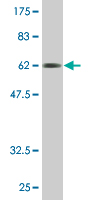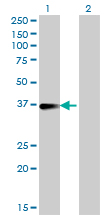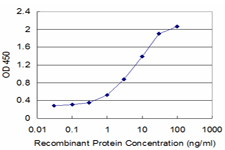FCER2 Antibody (monoclonal) (M14)
Mouse monoclonal antibody raised against a full-length recombinant FCER2.
- SPECIFICATION
- CITATIONS
- PROTOCOLS
- BACKGROUND

Application
| WB, E |
|---|---|
| Primary Accession | P06734 |
| Other Accession | BC014108 |
| Reactivity | Human |
| Host | mouse |
| Clonality | Monoclonal |
| Isotype | IgG2a Kappa |
| Clone Names | 2A7 |
| Calculated MW | 36469 Da |
| Gene ID | 2208 |
|---|---|
| Other Names | Low affinity immunoglobulin epsilon Fc receptor, BLAST-2, C-type lectin domain family 4 member J, Fc-epsilon-RII, Immunoglobulin E-binding factor, Lymphocyte IgE receptor, CD23, Low affinity immunoglobulin epsilon Fc receptor membrane-bound form, Low affinity immunoglobulin epsilon Fc receptor soluble form, FCER2, CD23A, CLEC4J, FCE2, IGEBF |
| Target/Specificity | FCER2 (AAH14108, 1 a.a. ~ 321 a.a) full-length recombinant protein with GST tag. MW of the GST tag alone is 26 KDa. |
| Dilution | WB~~1:500~1000 E~~N/A |
| Format | Clear, colorless solution in phosphate buffered saline, pH 7.2 . |
| Storage | Store at -20°C or lower. Aliquot to avoid repeated freezing and thawing. |
| Precautions | FCER2 Antibody (monoclonal) (M14) is for research use only and not for use in diagnostic or therapeutic procedures. |

Thousands of laboratories across the world have published research that depended on the performance of antibodies from Abcepta to advance their research. Check out links to articles that cite our products in major peer-reviewed journals, organized by research category.
info@abcepta.com, and receive a free "I Love Antibodies" mug.
Provided below are standard protocols that you may find useful for product applications.
Background
The human leukocyte differentiation antigen CD23 (FCE2) is a key molecule for B-cell activation and growth. It is the low-affinity receptor for IgE. The truncated molecule can be secreted, then functioning as a potent mitogenic growth factor.
References
Interleukin-9 polymorphism in infants with respiratory syncytial virus infection: an opposite effect in boys and girls. Schuurhof A, et al. Pediatr Pulmonol, 2010 Jun. PMID 20503287.Polymorphisms in innate immunity genes and risk of childhood leukemia. Han S, et al. Hum Immunol, 2010 Jul. PMID 20438785.Risk of meningioma and common variation in genes related to innate immunity. Rajaraman P, et al. Cancer Epidemiol Biomarkers Prev, 2010 May. PMID 20406964.New genetic associations detected in a host response study to hepatitis B vaccine. Davila S, et al. Genes Immun, 2010 Apr. PMID 20237496.Interaction of functional FCER2 promoter polymorphism and phenotype-associated haplotypes. Potaczek DP, et al. Tissue Antigens, 2009 Dec. PMID 19845913.
If you have used an Abcepta product and would like to share how it has performed, please click on the "Submit Review" button and provide the requested information. Our staff will examine and post your review and contact you if needed.
If you have any additional inquiries please email technical services at tech@abcepta.com.













 Foundational characteristics of cancer include proliferation, angiogenesis, migration, evasion of apoptosis, and cellular immortality. Find key markers for these cellular processes and antibodies to detect them.
Foundational characteristics of cancer include proliferation, angiogenesis, migration, evasion of apoptosis, and cellular immortality. Find key markers for these cellular processes and antibodies to detect them. The SUMOplot™ Analysis Program predicts and scores sumoylation sites in your protein. SUMOylation is a post-translational modification involved in various cellular processes, such as nuclear-cytosolic transport, transcriptional regulation, apoptosis, protein stability, response to stress, and progression through the cell cycle.
The SUMOplot™ Analysis Program predicts and scores sumoylation sites in your protein. SUMOylation is a post-translational modification involved in various cellular processes, such as nuclear-cytosolic transport, transcriptional regulation, apoptosis, protein stability, response to stress, and progression through the cell cycle. The Autophagy Receptor Motif Plotter predicts and scores autophagy receptor binding sites in your protein. Identifying proteins connected to this pathway is critical to understanding the role of autophagy in physiological as well as pathological processes such as development, differentiation, neurodegenerative diseases, stress, infection, and cancer.
The Autophagy Receptor Motif Plotter predicts and scores autophagy receptor binding sites in your protein. Identifying proteins connected to this pathway is critical to understanding the role of autophagy in physiological as well as pathological processes such as development, differentiation, neurodegenerative diseases, stress, infection, and cancer.




